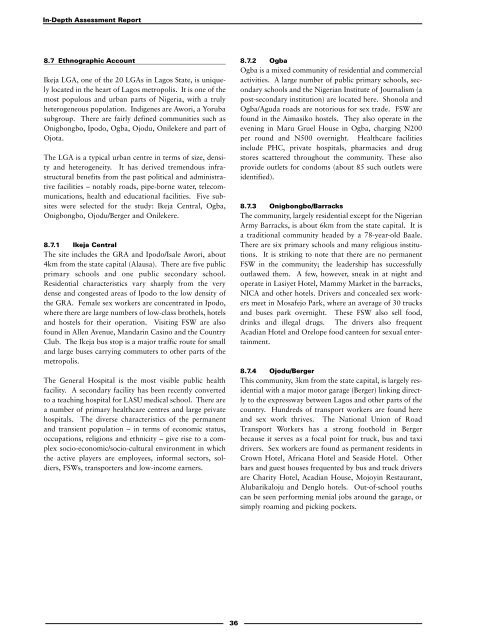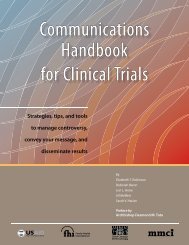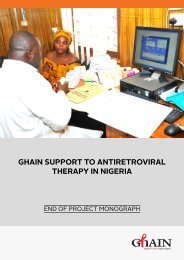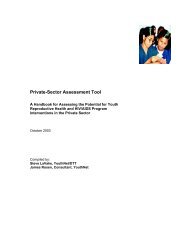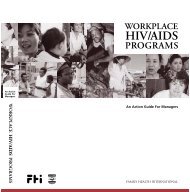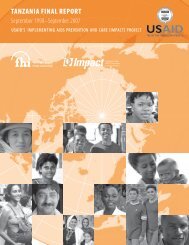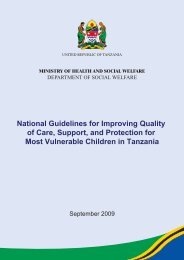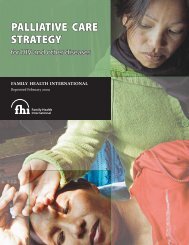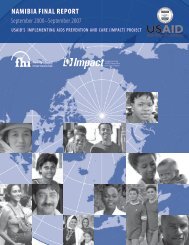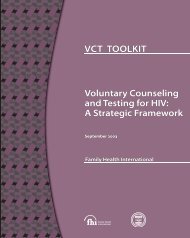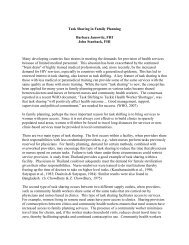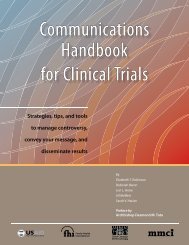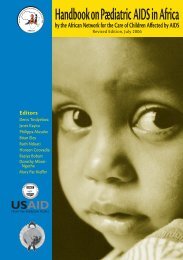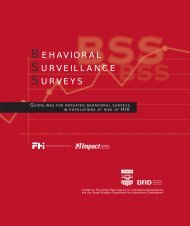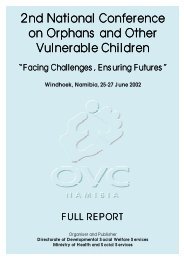Lagos State, Nigeria - Family Health International
Lagos State, Nigeria - Family Health International
Lagos State, Nigeria - Family Health International
You also want an ePaper? Increase the reach of your titles
YUMPU automatically turns print PDFs into web optimized ePapers that Google loves.
In-Depth Assessment Report<br />
8.7 Ethnographic Account<br />
Ikeja LGA, one of the 20 LGAs in <strong>Lagos</strong> <strong>State</strong>, is uniquely<br />
located in the heart of <strong>Lagos</strong> metropolis. It is one of the<br />
most populous and urban parts of <strong>Nigeria</strong>, with a truly<br />
heterogeneous population. Indigenes are Awori, a Yoruba<br />
subgroup. There are fairly defined communities such as<br />
Onigbongbo, Ipodo, Ogba, Ojodu, Onilekere and part of<br />
Ojota.<br />
The LGA is a typical urban centre in terms of size, density<br />
and heterogeneity. It has derived tremendous infrastructural<br />
benefits from the past political and administrative<br />
facilities – notably roads, pipe-borne water, telecommunications,<br />
health and educational facilities. Five subsites<br />
were selected for the study: Ikeja Central, Ogba,<br />
Onigbongbo, Ojodu/Berger and Onilekere.<br />
8.7.1 Ikeja Central<br />
The site includes the GRA and Ipodo/Isale Awori, about<br />
4km from the state capital (Alausa). There are five public<br />
primary schools and one public secondary school.<br />
Residential characteristics vary sharply from the very<br />
dense and congested areas of Ipodo to the low density of<br />
the GRA. Female sex workers are concentrated in Ipodo,<br />
where there are large numbers of low-class brothels, hotels<br />
and hostels for their operation. Visiting FSW are also<br />
found in Allen Avenue, Mandarin Casino and the Country<br />
Club. The Ikeja bus stop is a major traffic route for small<br />
and large buses carrying commuters to other parts of the<br />
metropolis.<br />
The General Hospital is the most visible public health<br />
facility. A secondary facility has been recently converted<br />
to a teaching hospital for LASU medical school. There are<br />
a number of primary healthcare centres and large private<br />
hospitals. The diverse characteristics of the permanent<br />
and transient population – in terms of economic status,<br />
occupations, religions and ethnicity – give rise to a complex<br />
socio-economic/socio-cultural environment in which<br />
the active players are employees, informal sectors, soldiers,<br />
FSWs, transporters and low-income earners.<br />
36<br />
8.7.2 Ogba<br />
Ogba is a mixed community of residential and commercial<br />
activities. A large number of public primary schools, secondary<br />
schools and the <strong>Nigeria</strong>n Institute of Journalism (a<br />
post-secondary institution) are located here. Shonola and<br />
Ogba/Aguda roads are notorious for sex trade. FSW are<br />
found in the Aimasiko hostels. They also operate in the<br />
evening in Maru Gruel House in Ogba, charging N200<br />
per round and N500 overnight. <strong>Health</strong>care facilities<br />
include PHC, private hospitals, pharmacies and drug<br />
stores scattered throughout the community. These also<br />
provide outlets for condoms (about 85 such outlets were<br />
identified).<br />
8.7.3 Onigbongbo/Barracks<br />
The community, largely residential except for the <strong>Nigeria</strong>n<br />
Army Barracks, is about 6km from the state capital. It is<br />
a traditional community headed by a 78-year-old Baale.<br />
There are six primary schools and many religious institutions.<br />
It is striking to note that there are no permanent<br />
FSW in the community; the leadership has successfully<br />
outlawed them. A few, however, sneak in at night and<br />
operate in Lasiyet Hotel, Mammy Market in the barracks,<br />
NICA and other hotels. Drivers and concealed sex workers<br />
meet in Mosafejo Park, where an average of 30 trucks<br />
and buses park overnight. These FSW also sell food,<br />
drinks and illegal drugs. The drivers also frequent<br />
Acadian Hotel and Orelope food canteen for sexual entertainment.<br />
8.7.4 Ojodu/Berger<br />
This community, 3km from the state capital, is largely residential<br />
with a major motor garage (Berger) linking directly<br />
to the expressway between <strong>Lagos</strong> and other parts of the<br />
country. Hundreds of transport workers are found here<br />
and sex work thrives. The National Union of Road<br />
Transport Workers has a strong foothold in Berger<br />
because it serves as a focal point for truck, bus and taxi<br />
drivers. Sex workers are found as permanent residents in<br />
Crown Hotel, Africana Hotel and Seaside Hotel. Other<br />
bars and guest houses frequented by bus and truck drivers<br />
are Charity Hotel, Acadian House, Mojoyin Restaurant,<br />
Alubarikaloju and Denglo hotels. Out-of-school youths<br />
can be seen performing menial jobs around the garage, or<br />
simply roaming and picking pockets.


